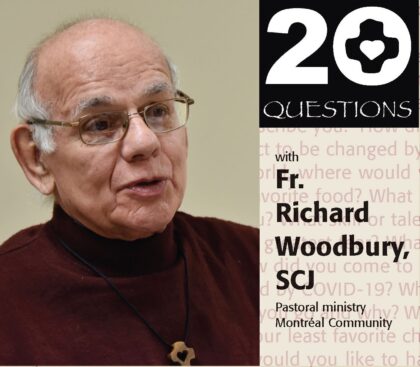 Favorite color? What makes you happy? What are you good at? What is your greatest fear… “Twenty Questions” is a regular feature in which SCJs and those with whom they minister and collaborate share a bit about themselves in an informal Q&A. Participants are given the same list of questions and are invited to answer as many as they would like.
Favorite color? What makes you happy? What are you good at? What is your greatest fear… “Twenty Questions” is a regular feature in which SCJs and those with whom they minister and collaborate share a bit about themselves in an informal Q&A. Participants are given the same list of questions and are invited to answer as many as they would like.
Fr. Richard Woodbury, SCJ, is a pastoral minister in Quebec, and a member of the Canadian Region. He serves on the regional council
Q: Where were you born and raised? Describe your family.
FR. RICHARD: I was born in Grenville, Québec, on July 19 ,1944. I am the tenth of 16 children, one of whom died after three days. We were six girls and 10 boys. Both my mother, a Catholic, and my father, an Anglican, were born in Grenville. We were raised in a climate of faith and love, and great respect for each other and for all people around us.
Q: What is your favorite book or movie?
FR. RICHARD: Definitely the film Romero is the movie that I appreciate the most. I have seen it at least 20 times, and I would sit down tomorrow to watch it again as if it were for the first time. What I appreciate most about it is the progressive “conversion” that Mgr. Oscar Romero goes through thanks to the challenges that he experiences from some of his priests and from his people.
Book? There are two, in fact. One I read when I was 17 and that really helped me to find my way. It is called Réussir, and was written by Michel Quoist, a French author. The other is La Force D’Aimer (translation of “The Power of Love”), written by Martin Luther King, Jr., which helped me understand that we are what we are and we have no good reason not to accept the wonderful challenge that life puts before us and do everything we can to become the best possible person.
Q: If you could travel anywhere in the world post-pandemic – without concern about the expense – where would you go and why?
FR. RICHARD: Honestly, I’d like to go back to Assisi and spend at least a month within the “carcere” letting myself be surrounded by the indescribable atmosphere of prayer, peace and presence of God that I experienced during the few hours that I had the chance to spend there.
Q: What are you good at?
FR. RICHARD: This is a tricky question that I would rather let others answer. I think that I can say that I am good at listening to people, whoever they may be and whatever their experience might be, trying to understand them and sharing with compassion and empathy where they are at.
Q: What is your favorite color?
FR. RICHARD: Blue is certainly my favorite color, probably because skies are blue most of the time, and the sea is of the same color. That gives me hope, and it also reminds me of the robe of the Virgin Mary, who is clothed with that same color.
Q: Do you have any hobbies or pastimes? If so, what are they and how did you get interested in them?
FR. RICHARD: I love doing exercises and playing different sports, like hockey, football, baseball and softball, soccer and handball, even though the years have done some damage that keeps me from playing most of those sports now. I really enjoy playing golf, and I like reading spiritual books, like those of Joan Chittister whose books have been translated in French.
Q: What is your favorite food?
FR. RICHARD: I very much like boiled beef (bouilli, in French, made of beef and of different vegetables). It is finger liking good!
Q: What is your least favorite chore?
FR. RICHARD: As a parish priest, I really dislike the duty that is ours to fill all kinds of papers and forms just for the sake of doing paperwork. I was not ordained to do that kind of work, even though I can understand that it may be necessary, but not too often. I once told a friend that when I get at the door of Heaven, the question I’d like to ask is “Are there meetings in here?”, hoping, wishing and praying that Saint Peter’s answer will be “No!”
Q: Who — living or deceased — do you most admire and why?
FR. RICHARD: There are many persons whom I admire, but I certainly have a special admiration for someone who has inspired me for years now, that is Mgr. Oscar Romero. He has helped me to understand that the Gospel cannot simply be a book that you read and then put aside, but it has to become a way of life that calls you to deep conversion which leads you to live like Christ did. Mgr. Romero made that choice and lived up to it. Honestly, in my heart, I had “canonized” Mgr. Romero way before he was officially recognized as a saint.
Q: What would surprise people to learn about you?
FR. RICHARD: I have a deep aversion and disgust for all kinds of snakes (serpents). Where does it come from? Maybe I have been influenced by the experience of Adam and Eve in the Garden? When I was a kid at home, and if my brothers and I did something wrong, my father would call on us by saying “Ah! Mon serpent!” We quickly understood!
Q: What skill or talent would you like to have that you do not? Why?
FR. RICHARD: This question is very easy for me to answer. It is drawing. In fact, I often told friends that I was “Un sans dessein”, a play on words that refers to my incapacity of drawing even two straight lines. When I was in third grade we had a period of drawing on every Friday afternoon at 3PM. One day when we were drawing the teacher picked up my drawing sheet and showed it to the rest of the classmates, saying: “Here is what you must not do!” That was the end of what might have become a great career.
Q: As a child, what did you want to be when you grew up?
FR. RICHARD: As far as I can remember, I always wanted to become a priest, influenced that I was by the parish priest we had in Grenville who was a very holy person, very dedicated and especially attentive to the poor people of the area. Our family was among them. I did what we called “messes en blanc” with some of my friends, and, of course, I was the presider.
Q: What makes you happy?
FR. RICHARD: Whenever I see people enjoying and celebrating life in their own personal ways, I fully share their joy and happiness. And if I can help people in any way to discover the beauty of life and to choose paths that will allow them to find happiness again in their lives, then I give thanks to the Good Lord.
Q: What is your greatest fear?
FR. RICHARD: It is to realize that at times I could be completely in left field in regards to my commitments and duties as a religious and a priest, and thus possibly, and even probably keep people from finding in me a man of God, a friend, a brother, a “copain” (a “pal”).
Q: What trait or habit do you dislike in yourself?
FR. RICHARD: I sometimes postpone to tomorrow things that I could and should do today, and it really affects me badly if I have to realize that “tomorrow is now too late!”
Q: What trait or habit do you dislike in others?
FR. RICHARD: When someone promises that he’ll be there to help you for any kind of task and he does not show up. I really think that “Our shoes must always follow our lips”.
Q: List three words that describe you.
FR. RICHARD: Respect (for self and for others), trust, and availability to all people and all situations.
Q: How did you come to know of the Priests of the Sacred Heart (Dehonians) and what interested you about them?
FR. RICHARD: There was an SCJ priest helping out in Grenville whom I had a chance to get to know and chat with: Father Guillaume Berkers. He told me about the minor seminary which had been opened in Pointe-au-Chêne in 1953, and he invited me to “come and see”. At the end of my sixth year in grammar school, I did not follow his advice and went to the diocesan seminary. I lasted for three days. I got homesick and came back to Grenville to complete grammar school. The next year, in 1958, I came to the Séminaire du Sacré-Coeur. I felt at home from the very first day.
Q: Do you consider yourself a Dehonian? If so, what does that mean to you?
FR. RICHARD: Just as we cannot consider ourselves as being Christians, but rather as persons who work and fight to become Christians, I do dream of becoming a true Dehonian, but I know I still have a long way to go. Each day I do my best to follow in Fr. Dehon’s footsteps, trying to develop and acquire the genius he had to understand the real needs of the society we live and work in order to find remedies to the different evils and ills which affect its people.
Q: What changes, adaptations or insights do you expect to stay with you from the pandemic? In other words, how do you expect to be changed by COVID-19?
FR. RICHARD: I cannot promise anything, since we all know that human beings often get back to their bad habits as soon as they are given the occasion to do so, but I do hope that the main lesson I’ll get from this pandemic is the necessity for human beings to be together, to communicate beyond emails or any other electronic devices, to work together and in this same regard, to learn how to stick to the essential realities of our life. Through these tough four past months, I have discovered so many things that are just superfluous. So, I pray: “Lord, grant me the serenity to accept the things I cannot change and the courage to change the things that I can.”


